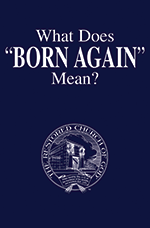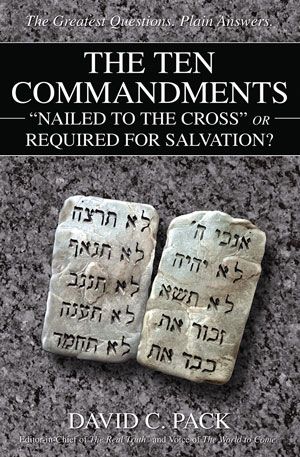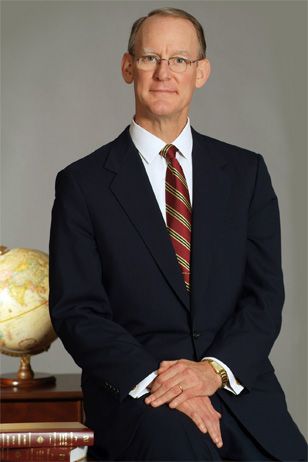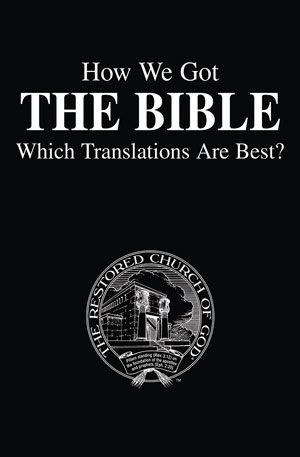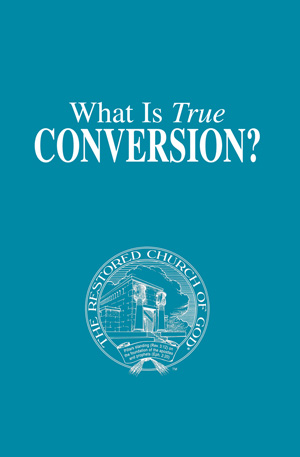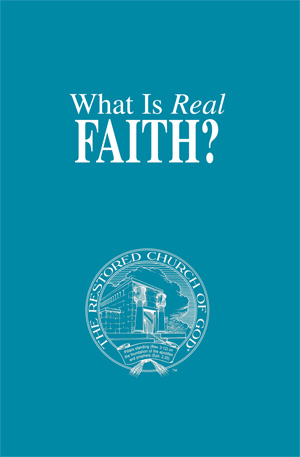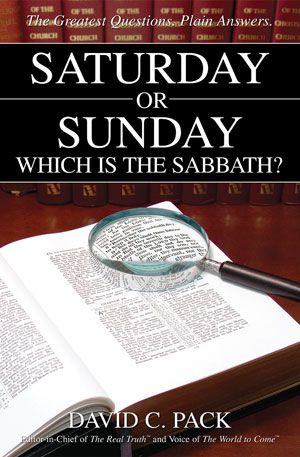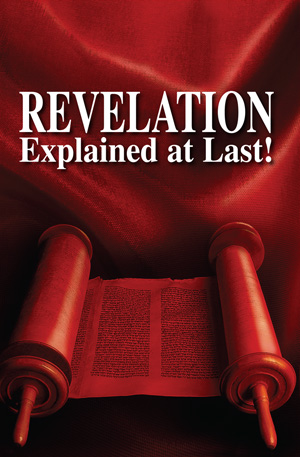All who have been called to God’s way of life have struggled against the pulls of the flesh and the temptations of Satan and his world. Some overcome. Others do not.
Christ said, “Enter you in at the strait [difficult] gate: for wide is the gate, and broad [easy] is the way, that leads to destruction, and many there be which go in thereat: because strait [difficult] is the gate, and narrow is the way, which leads unto life, and few there be that find it” (Matt. 7:13-14). Most seek the easy, “broad” path.
Overcoming is hard—difficult!—it is a life-long struggle. But it IS possible. You can overcome. If you are a Christian, you must!
Yet, this world is drifting along, completely unaware of God’s marvelous purpose for man, which is to build character in this life. He is preparing a team of those who will qualify to be part of restoring His government to Earth at Christ’s Return.
The Bible Pattern
The Bible is filled with accounts of God’s greatest servants battling to overcome sin. In nearly every case, they had to learn difficult, and sometimes painful, lessons. When examined collectively, Moses, Noah, David, Samuel, Peter and others are seen to have fought every kind of problem known to man. They battled sins, weaknesses, faults, attitudes, and pulls and temptations of the flesh. David fought sins and wrong attitudes and overcame them. Moses lacked faith and confidence and had a temper that he had to overcome. Yet, he will hold a high office in God’s Kingdom. Both Job and Elijah fought discouragement and depression, even to the point of wanting to die. But these men endured—they overcame. They slew their problems, rather than being slain by them!
These men were actively trained by God and had to overcome Satan, the temptations of his world and the pulls of the flesh. A Christian is one who overcomes his problems, weaknesses, sins and wrong attitudes, rather than being overcome and defeated by them!
To the Overcomer
Through John, Christ said, “And he that overcomes, and keeps My works unto the end, to him will I give power over the nations: and he shall rule them with a rod of iron” (Rev. 2:26-27).
In His instruction to the Laodicean era of His Church, He adds, “To him that overcomes will I grant to sit with Me in My throne, even as I also overcame, and am set down with My Father in His throne” (Rev. 3:21).
These verses picture Christ re-establishing God’s government over all nations of the Earth. Christians will receive real power to rule. But first they must overcome.
Christians are those who follow—who copy—Christ (I Pet. 2:21). Then what is the pattern Christ established for us to follow? Did He overcome?
In reference to His own struggle to remain free of sin, perfect in character, Christ said, “In the world you shall have tribulation [how true!]: but be of good cheer; I have overcome the world” (John 16:33). Christ had overcome both the world and its god—Satan (II Cor. 4:4). Recall that Christ said, “even as I also overcame, and am set down with My Father in His throne.” Jesus Christ overcame and qualified to rule. Just as He qualified to replace Satan, so must we!
Such enormous power to rule could never be given to people who are unprepared—who have not qualified to properly use it. God will not hand great authority to people who might rebel and revert to Satan’s ways. God’s servants must use this life to build His very character, so necessary for those holding offices of great authority.
Experienced in Sin
Understand! You have been practicing yielding to the flesh and Satan’s way for your entire life. You have probably become very good at both. Believe me, as you strive to overcome and resist the pulls at work within you, you will find that wrong patterns of conduct are “second nature” to you—more than you now know! Left unchecked, human nature consists of vanity, jealousy, lust, greed, envy, resentment, hatred, anger, pride, rebellion, foolishness, deceit and hostility toward God. This is what you have been practicing—possibly for decades.
Overcoming will not be easy or happen overnight. It is a life-long struggle against well-established attitudes and a former way of life that the Christian has now rejected and turned from. The one who is walking God’s path is striving to curb and withhold himself wherever God’s Word instructs. He strives to exercise himself in all matters where God says to do so. When God gives instruction to do something, he strives to do it! When God gives instruction not to do something, he strives not to do it!
Learning to do this takes a lifetime. But remember: Building character is why you were born. Your job is to “put off” the fleshly pulls of human nature, and to “put on” the character of God and Christ (Col. 3:8-13). Though this is not easy, the reward is great.
God looks on the intent of your heart. It is your overall desire and motivation that is important to Him. He wants to know if, after you sin, you are sorry for it and are determined to strive to do better. He understands the temptations that beset us even better than we do. He watches to see if we will be sober and vigilant as we root sin out of our lives. Will we carelessly fall back into old patterns? Will we try to overcome on human strength and energy?
God’s Power at Conversion
We have seen that a Christian is led by the Holy Spirit of God (Rom. 8:9, 14). It enters at repentance and baptism (Acts 2:38). It is this Spirit in a converted mind that empowers one with the strength to change what human “steam” alone cannot. II Timothy 1:7 states, “For God has not given us the spirit of fear; but of POWER, and of love and of a sound mind.”
The Greek word for power is dunamis. It means “special miraculous power or force.” At conversion, you were literally given real power! This power builds up and establishes the righteousness of God within your character. You must draw upon the strength from God’s Spirit on a daily basis to successfully overcome. This strength is unlimited and is sufficient to defeat any sin, problem or attitude—no matter how large and foreboding such may appear!
But make no mistake! We must not build our own righteousness. This does not impress God. He sees it as so many “filthy rags” (Isa. 64:6). Paul wrote of his own personal hope, as a Christian, to “be found in Him, not having Mine own righteousness, which is of the law, but that which is through the faith of Christ, the righteousness which is of God by faith” (Phil. 3:9).
The Role of Faith
Exactly what role does faith play in overcoming—in growth? It does play a role, but how?
It is the very faith of Christ that works in a Christian. But grasp this. It does assist in performing works in all those who are led by God’s Spirit. Expect God’s help.
Almost universally, theologians, religionists and churchmen stop reading after Ephesians 2:8-9 (“by grace are you saved through faith; and that not of yourselves: it is the gift of God: not of works, lest any man should boast”) and ignore vitally important verse 10: “For we are His workmanship, created in Christ Jesus unto good works, which God has before ordained that we should walk in them.” That is right! Christians must “walk…in good works” as “His [God’s] workmanship,” overcoming daily.
Christ at Work
Quite literally, Jesus Christ lives His life in the Christian. Without His help, you will get nowhere—fast! You must exercise the fruit of faith from God’s Spirit (Gal. 5:22-23), knowing that Christ is at work in you—if you are striving to yield to Him and doing all that you are capable of carrying out.
In John 15:5, Christ said, “bring forth much fruit” and then stated, “…for without Me you can do nothing.” Human power—human energy—only helps a person overcome in physical areas. Spiritual problems cannot be conquered through physical effort.
Christ is the Vine and we are the branches (John 15:5). The branches must be connected to the Vine. This happens through God’s Spirit working in your mind.
When speaking of the way God’s Spirit works, Jesus said, “out of his belly shall flow rivers of living water. (But this spoke He of the Spirit, which they that believe on Him should receive…)” (John 7:38). As it performs good works, God’s Spirit flows “out of” the Christian. It does good works. Therefore, it must be replenished, or it will be depleted and disappear completely. This is why Jesus also said, “If you…know how to give good gifts unto your children: how much more shall your heavenly Father give the Holy Spirit to them that ask Him?” (Luke 11:13). You must regularly ask, in prayer, for more of the Holy Spirit.
Paul wrote, “my brethren, be strong in the Lord, and in the power of His might” (Eph. 6:10). Christ also said, “with God all things are possible” (Matt. 19:26). With God’s Spirit actively working and growing in you, this can also be true of you! Exercise the faith of Christ as you work on yourself.
And remember! Deep conversion does not occur overnight. Paul wrote to the Corinthians that they were “babes [babies] in Christ” (I Cor. 3:1). He described how they required “milk,” instead of “meat,” for food. The brand new Christian is much like an infant. By analogy, he first learns to roll over, then crawl, before walking (and, at first, in an unsteady, toddling fashion). Only later does he finally learn to run (spiritually).
Paul compares conversion to running a race (I Cor. 9:24). At some point, the runner must develop great speed, because Paul says, “run, that you may obtain [win].”
Such is the Christian way of life. Slow, steady growth, through daily practice, produces progress in the life of the person who is copying Christ. The new Christian sincerely strives, from the heart, to be different—to turn around and go the other way, the way of God, for the rest of his life!
Apply yourself! Push yourself to grow and overcome. Do not expect it to be easy, like “falling off a log.” Grow in knowledge as well (II Pet. 3:18).
Resisting Temptation
Christ taught His disciples to understand the pulls of human nature at work within them. When He taught, “That which comes out of the man, that defiles the man. For from within, out of the heart of men, proceed evil thoughts, adulteries, fornications, murders, thefts, covetousness, wickedness, deceit, lasciviousness, an evil eye, blasphemy, pride, foolishness” (Mark 7:20-22).
These same attitudes, pulls of the flesh and wrong patterns of conduct are also at work within you and me. They leave us fertile for temptation by Satan.
Therefore, many kinds of trials, tests and temptations will be thrown at you all through life. You must successfully resist them. They will often come when you least expect them. The devil will try to strike you where you are weakest—most vulnerable—least prepared. You must be on guard at all times—in a constant state of readiness! Do not assume you are stronger or more prepared than you think. Consider this: “Wherefore let him that thinks he stands take heed lest he fall” (I Cor. 10:12).
James explained how temptation can turn into sin: “But every man is tempted, when he is drawn away of his own lust, and enticed. Then when lust has conceived, it brings forth sin: and sin, when it is finished, brings forth death” (1:14-15). Put out wrong thoughts. Do not ease up or assume victory before they are gone!
Peter added, “Be sober, be vigilant; because your adversary the devil, as a roaring lion, walks about, seeking whom he may devour” (I Pet. 5:8). And James also instructed, “Submit yourselves therefore to God. Resist the devil, and he will flee from you” (4:7). Peter continued, “Whom resist steadfast in the faith, knowing that the same afflictions are accomplished in your brethren that are in the world” (I Pet. 5:9).
The second part of this verse offers encouragement: You are not alone in your struggle to overcome sin. All human beings face the same problems. Understand! “All have sinned” (Rom. 3:23) and “sin is the transgression of the law” (I John 3:4). God promises that “sin shall not have dominion over you” (Rom. 6:14).
Here is how Paul explained forces at work within him: “For that which I do I allow not: for what I would, that do I not; but what I hate, that do I…For the good that I would I do not: but the evil which I would not, that I do” (Rom. 7:15, 19).
This pictures what we all face. When you feel like this, battle! Resist! Use God’s power within you. Call out to Him for help and always remember that you must “Draw near to God, and He will draw near to you. Cleanse your hands, you sinners; and purify your hearts, you double minded” (James 4:8).
Certainly, fulfilling this verse in your own life is not an overnight process. It takes time and much effort.
Seek God through earnest, regular, believing prayer. Commune with God daily. Pray without ceasing (I Thes. 5:17-18). Study your Bible (Matt. 4:4). Drink it in as God’s Word—as Him talking to you personally, in the same way prayers are you talking to Him!
Above all, do not become discouraged and give up when the temptation is severe and appears unrelenting. Never forget that “there has no temptation taken you but such as is common to man: but God is faithful, who will not suffer you to be tempted above that you are able; but will with the temptation also make a way to escape, that you may be able to bear it” (I Cor. 10:13).
This is God’s sure promise to all who seek to overcome!
Christ Overcame and Qualified to Replace Satan
Resisting the temptation of the devil was central to Christ overcoming sin. Matthew 4 contains the account: “Then was Jesus led up of the Spirit…to be tempted of the devil” (vs. 1). The devil repeatedly tempted Christ, in various ways. Carefully read the account. At the end of several attempts by Satan to break Christ’s will, the account climaxes.
You will notice that, after being offered all the kingdoms of the world, Christ rebuked Satan (vs. 10), stating, “Get you hence, Satan.” This is a nice way of saying that Christ told the devil to “get out.” At this point, the temptation ended and the devil departed. Christ had successfully resisted!
Be prepared to tell Satan to “Get out” of your life as often as you have to. Successfully resist him by submitting to God completely—in all things!
Christ passed a very real test! He overcame the world, His flesh and the devil in overcoming sin and qualifying to pay for the sins of the world.
Recall, when speaking of having overcome the world, Christ said, “Be of good cheer.” You can overcome in the same way that Christ did.
Seven Steps to Permanent Change
Applying the following seven basic steps will help you overcome problems that you face. They represent principles that will work in the process of overcoming no matter the size of the problem or problems that you face.
If you diligently apply them, they will be a formula that will help you to permanently overcome in your life.
(1) Honestly face the problem. Many people will not squarely face their problems. They hide their eyes from reality. Jeremiah 17:9 declares, “The heart is deceitful above all things, and desperately wicked: who can know it?” Most people willingly deceive themselves about their problems. Honestly face your problems. Look them right in the eye and see them for what they are.
(2) Do not get discouraged. It is very easy to get discouraged now that you have acknowledged your problems. It is easy to be disheartened. This is natural. Be ready for this feeling to possibly strike you, after you have honestly faced the weakness, sin or fault that you are now ready to tackle. Paul wrote of those who are “troubled on every side, yet not distressed…perplexed, but not in despair” (II Cor. 4:8-9). You may feel this way as you face your problems, but do not get discouraged. Move on to the next step.
(3) Set your will. Absolutely determine that you are going to defeat each particular problem and that each will not defeat you! Take a do-or-die approach to the battle that lies before you. It has been said that the hardest battle is the first battle. Set your will to address each sin or weakness successfully. Tell yourself that you are going to defeat it—that you are going to rip it from your character. But recognize that you cannot fight the battle on your own. You must move to step four.
(4) Form a partnership with god. If you set out to overcome on human strength alone, you will fail. That is assured. We have already touched on this. Paul wrote, “I can do all things through Christ which strengthens me” (Phil. 4:13). Jesus said, “I can of My own self do nothing” (John 5:30). On another occasion, when speaking to His disciples and talking about those who have certain things to overcome, Christ also said, “With men this is impossible; but with God all things are possible” (Matt. 19:26). Simply believe Christ’s words. If He could do nothing on His own, neither can you or I. Be sure that you have formed a partnership with God and are not working on your own.
(5) Start right where you are. Admit that the problem is whatever size that it is. Neither overstate nor understate it. If it is a BIG problem, admit it! This is part of honestly facing it. If you are trying to overcome any pull of the flesh or temptation that has existed for a long time—that has been part of you for many years, even a lifetime—admit the size of the problem. It has been said, “The longest journey begins with a single step.” That is true for the Christian. No matter how long it takes, or where you are when you start, start wherever you find yourself. If you have wasted time in deciding to address the problem, admit it. Acknowledge where you are and “Redeem the time” (Eph. 5:16).
(6) Be willing to pay the price. The Bible describes some who “grow weary” and “faint in the day of adversity” (Prov. 24:10). Solomon wrote that “their strength is small.” Paul wrote, “And let us not be weary in well doing: for in due season we shall reap, if we faint not” (Gal. 6:9). Everything of value in life comes at a cost—a price. Sometimes this involves pain, suffering. Pay the price. Paul wrote that even Christ “learned obedience by the things which He suffered” (Heb. 5:8). None of us enjoy pain, but sometimes it is inescapable in the overcoming process. The Psalmist said, “Before I was afflicted I went astray: but now have I kept Your word” (Psa. 119:67). Four verses later, he added, “It is good for me that I have been afflicted; that I might learn Your statutes” (vs. 71).
(7) Do not give up before you have succeeded. Paul talked of running in a race and finishing his course. He said that he “pressed toward the mark” (Phil. 3:13) on his way to the Kingdom of God. Solomon wrote, “For a just man falls seven times, and rises up again” (Prov. 24:16). Do not give up. Do not ever give up! Wrestle, battle and struggle until you have completely overcome whatever obstacle, weakness, sin or problem you are facing!
Follow these points, always employing one step at a time. They have helped many to win the war of overcoming!
A Lifelong Battle
Recall that “He that endures to the end shall be saved.” Living a life of growing and overcoming is not easy. It is a constant, daily struggle against the pulls of the flesh and the temptations of sin. But we are now being judged.
Peter wrote, “For the time is come that judgment must begin at the house of God: and if it first begin at us, what shall the end be of them that obey not the gospel of God? And if the righteous scarcely be saved, where shall the ungodly and the sinner appear?” (I Pet. 4:17-18).
Paul recognized that he—his words, deeds and thoughts—was being judged. Notice: “And this I do…that I might be partaker thereof with you. Know you not [most do not] that they which run in a RACE run all, but one receives the prize? So run, that you may obtain [win]. And every man that strives for the mastery [championship or victory] is temperate in all things. Now they [non-Christians] do it to obtain a corruptible crown; but we [Christians] an incorruptible. I therefore so RUN, not as uncertainly; so FIGHT I…lest that by any means, when I have preached to others, I myself should be a castaway [failure, loser]” (I Cor. 9:23-27) and “Wherefore…let us lay aside every weight, and the sin which does so easily beset us, and let us run with patience the RACE that is set before us” (Heb. 12:1).
Paul fought mightily against sin. He saw two opposing forces at work within his own mind. Notice the intensity with which he struggled to overcome the pulls within him: “For I know that in me (that is, in my flesh,) dwells no good thing: for to will is present with me; but how to perform that which is good I find not…I find then a law, that, when I would do good, evil is present with me. For I delight in the law of God after the inward man: but I see another law in my members, warring against the law of my mind, and bringing me into captivity to the law of sin which is in my members” (Rom. 7:18, 21-23).
He described Christianity as “wrestling” against the “wiles of the devil” (Eph. 6:11-12)—all who have wrestled understand how physically grueling this sport can be. And he instructed the Philippians to “press toward the mark for the prize of the high calling of God in Christ Jesus” (3:14). He recognized that it takes great effort to run and win a long race.
Paul’s overcoming represents a classic example of how one of God’s greatest servants fought to overcome sin. At the end of his life, he was able to say that he had “fought the good fight” and that he had “run his course” knowing that a “crown” awaited him. But this did not happen without much wrestling, pressing, running, fighting and warring against the human nature that he strove to overcome.
But he also understood that his race was a marathon, not a sprint. So is yours.
A Lifetime Effort
If you are an adult, it took you 15 to 20 years just to grow to a certain height. This long, physical growth process probably included a number of “growing pains.” No doubt, you fell and skinned your knee or bloodied your nose many times before you reached adulthood. Christianity is no different! Do not become discouraged and quit growing, any more than a child should become discouraged and “quit life” simply because he may have fallen down or skinned a knee. When your child falls, you tell him to get up, because it is part of life. Christianity is no different!
Children always want to grow up faster than life’s timetable allows. Though childhood is wonderful in so many ways, it seems that most young people cannot wait for adulthood. Christianity is no different! But full, mature Christian adulthood only comes after a long period of practicing the right way of life.
Perfection is a goal that carries with it a way of life that must govern one’s every thought, action and word. God looks on the heart, the intention of a person who is yielded to Him. As long as he is spiritually growing and overcoming—and led by the Holy Spirit—he remains a converted, begotten son of God.
It is only through regular prayer, Bible study, meditation and even fasting (going without food and water for a period of time) that the Christian will be able to overcome the three foes that lie in wait for him every day of his life.
Eventually, all nations will sit before the God of the Bible. Some will have qualified to rule and some will not. Notice: “When the Son of Man shall come in His glory, and all the holy angels with Him, then shall He sit upon the throne of His glory: and before Him shall be gathered all nations: and He shall separate them one from another, as a shepherd divides his sheep from the goats: and He shall set the sheep on His right hand, but the goats on the left. Then shall the King say unto them on His right hand, Come, you blessed of My Father, inherit the kingdom prepared for you [all those who have overcome] from the foundation of the world” (Matt. 25:31-34).
The government of God will soon be restored to Earth, and all who have prepared themselves will “inherit the kingdom.” Only the overcomers, those who successfully submitted to God and resisted Satan throughout their lives, shall take part in this glorious future: “He that overcomes shall inherit all things; and I will be his God, and he shall be My son. But the fearful, and unbelieving, and the abominable, and murderers, and whoremongers, and sorcerers, and idolaters, and all liars, shall have their part in the lake which burns with fire and brimstone: which is the second death” (Rev. 21:7-8).
How to Prevent Sin
In his article “How to Prevent Sin,” Herbert W. Armstrong concluded with the following. Notice the important key he described. It will also help you:
“The way to put a thing out of the mind is to put an opposite thought in the mind. So often I have noticed parents of babies strive so hard to ‘shush’ up the baby when it is crying. There’s either something causing pain, which should be removed, or something is in the baby’s mind that is causing its crying or fretting. Just saying ‘shush!’ or commanding the baby to stop fussing doesn’t usually get very good results. We have reared four children, and long ago I learned the trick of quieting the baby by getting its mind on something else. Instead of commanding it to stop crying, attract its attention with some new object—get it interested in playing with that object…and before you know it the child will forget all about its crying.
“Try using this same method on yourself. But instead of material or worldly things, a mature person should use self-discipline and set his mind on spiritual things. Open your Bible. Put the study of some spiritual subject in your mind. Next time you are tempted, try it. Pray over it. Ask God to help you. See how rapidly you begin to win the victory over temptation and sin, and how marvelous will be your spiritual and character growth.”
Mr. Armstrong concluded a related article “How to be an Overcomer” with the following:
“If we draw nigh to God, and then keep close to Him, our problem will be solved. We will then have the FAITH. We will then be filled with His Spirit—His power to overcome.
“We can keep in spiritual training only if we keep our affections—our minds—our thoughts—on spiritual things. Read Col. 3:1-10. Most of us keep our minds filled with earthly, material cares and interests, turning to the spiritual only occasionally! Seek first the Kingdom of God and His righteousness!
“ Sometimes it takes a siege of fasting and prayer— earnest, determined, persevering prayer—seeking God with all our might—with weeping—staying with it, determined, until we get through. Then we must keep in continuous prayer. Cast all our cares upon Him. We are not doing that. If we do, there will be many things each day to pray about! And it takes daily private prayer, in real earnest, besides family prayer. Is eternal life worth it?”
God’s Word Points the Way
A final quote from Mr. Armstrong sums up this book. It is taken from his “Personal from the Editor” in Tomorrow’s World, May-June, 1970:
“The world has rejected God’s Law—God’s way. It has gone the way that has brought every curse on mankind. The world tomorrow will change all that. It will be ruled by God’s law!
“To qualify to become a King—a ruler in the kingdom of God—you must come to really know that Law. And the whole Bible is a magnification—an elaboration of its principles. It is only those who repent of their transgressions of God’s great spiritual Law—the Ten Commandments—and who surrender to and accept as Savior Jesus Christ, who can become begotten children of God. No one is a true Christian until he has received the Holy Spirit of God (Rom. 8:9). That is God’s gift. It imparts the very life of God. It renews and opens the mind to comprehend spiritual knowledge. It bestows the love of God—divine, spiritual love. It imparts power. It instills faith.
“Then, once really converted—the entire direction of your life changed—you must continually overcome. There are three very tough things to overcome—your own self with the pull of human nature; the world, with its customs, false teachings, wrong ways, wrong fellowships; and the invisible yet very real devil. You must grow not only in spiritual grace, but in the knowledge of Christ—the knowledge in God’s instruction book—the Holy Bible. You must study—understand it—live henceforth by its directions. It points the way—walk ye in it!”
Much Knowledge
This book has brought extraordinary understanding to you, knowledge presented by no other organization. It has thoroughly examined the subject of the Ten Commandments. You have seen that they are the Law of God, not the law of Moses—and that every one of them was ordained (though certainly not always kept) from the time of Creation. You have seen sin defined—Old Testament and New—and learned that every one of the Ten Commandments was referenced in the New Testament. You also learned that New Testament grace does not “free” people from obedience to laws that were always intended to be for more than merely the Jews or the Israelites.
What About You?
In the end, you have seen the beauty, logic and simplicity of each of God’s ten commands. You have seen the many benefits to the world if all people kept them. You have seen that Christians must overcome and prevent sin. You have seen that the Ten Commandments were not “nailed to the cross” but are required for salvation.
When confronted with difficult choices, most take the easier path. Will you swim against the popular current of all others around you? Will you obey the God of the Bible? Will you come to be and then remain close to God? Will you strive to live by each of the Ten Commandments (and other laws and principles of God) every day of your life?
Will you overcome and inherit all things?

